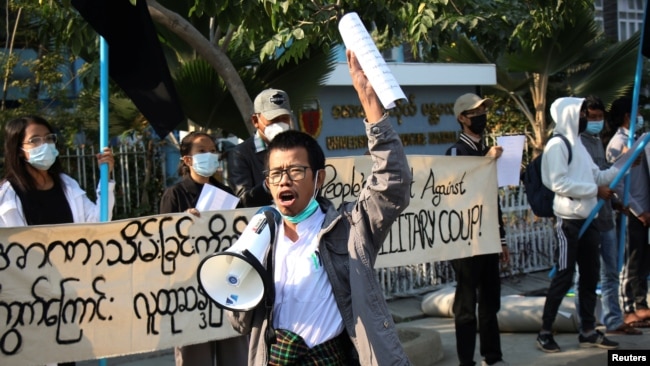ミャンマー、続く混乱 They are still there.
“I don’t want the people to forget about the young people who are sacrificing their lives on the ground,”
”We’re still here.”
重く心に響きます。
胸に強く届きます。
最初は頻繁に流れていた報道もアフガニスタン同様、何事もなかったかの様に報道されなくなります。
国連など国際機関が圧力をかけるだろう、放って置くことはよもやあるまい、と思っていましたがその期待も虚しく、今この瞬間も人々の戦いは続いています。
わたしに何ができるだろうかと非力さを痛感し絶望しますが、それでも関心を持ち続け、思いを発進し続け、人権の大切さを人と分かち合っていこうと思います。
イデオロギー・価値観の異なる社会やグループの人々と民主主義の正義や道徳を分かち合うのは不可能なのだと最近確信しました。考え方・物事の捉え方がまるっきり違うので、話し合いは平行線のまま、気持ちも交わることはないのだなあと、変に納得しています。そうとわかった上で、さて、どうやって国際社会は対応していくべきなのでしょうか。
Let's begin!!
VOAで英語を磨き、世界を見つめよう!!
ビルマの若者たちは、危険を冒して軍の指導者と戦っている
Young Burmese Risking All to Fight Military Leaders
Gue Gue グエグエさんはかつて、21世紀に入って急速に発展した古代の王宮都市、Myanmarミャンマーの Mandalayマンダレーで旅行ガイドをしていました。今日、この街にはピカピカのショッピングセンターがあり、着飾った学生や人気のあるレストランがあります。
グエさんは、自分が政治的に活動しているとは思ってもいませんでした。しかし、それが変わったのは今年の初めのことです。2月1日、ミャンマーの軍部がクーデターを起こし、文民政府を転覆させました。その後、数ヶ月の間に、数百人のデモ参加者が路上で軍隊によって殺害されました。
今、グエさんは反乱軍の隠れた訓練所にいます。
レジスタンスのメンバーは、軍政に対する”最後の戦い”をすると言っています。
今の世代の若者は、親と違ってスマートフォンが普及し、政治的自由度の高い世界で育ってきました。彼らは、自分たちを暗い過去に引き戻そうとする政府を打倒するためには、どんな代償も払う覚悟があると言います。
4月のある夜、グエさんは密かに実家を出ました。数週間後、彼女はジャングルの中にある反乱軍の訓練キャンプにいました。そこで彼女は緊急事態に見舞われたのです。盲腸が感染し、切除しなければならなくなったのです。手術は設備の整っていない医療センターで行われ、痛みを和らげる薬もなく、手術の間、彼女は起きていなければなりませんでした。
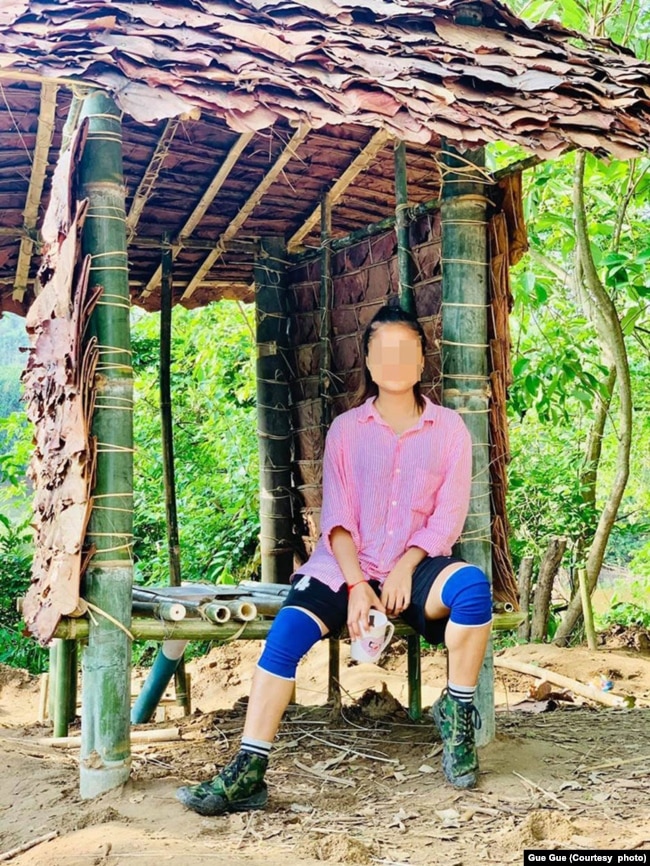
“I never dreamed that I would be sleeping in a roofless shelter or using a makeshift toilet,” said Gue Gue, shown at the toilet she helped build. Source: courtesy of Gue Gue「屋根のないシェルターに寝泊まりしたり、その場しのぎのトイレを使うことになるとは夢にも思いませんでした」と、彼女が建設を手伝ったトイレを見せて、Gue Gueさんは言いました。出典:グエグエさん提供
クーデター以来、グエグエさんは、故郷の路上で民主化を求めていた同世代の多くの人々が軍隊に殺されるのを目の当たりにしてきました。増え続ける軍の暴力に対して、国際社会が行動を起こすことを期待していました。しかし、何の対策も講じられなかったため、グエグエさんのような何千人もの人々が、唯一の選択肢は武力であると考えたのです。
レジスタンスの2つの顔
1948年に独立国となって以来、軍はこの国で最も強力な機関です。軍は長年にわたり、民衆の反乱や内戦に立ち向かってきました。人権派のAung San Suu Kyi アウンサンスーチー氏が登場するきっかけとなった1988年の蜂起もその一つです。
ミャンマー軍に反旗を翻している男女は、自分たちが国軍の支配下で生きる最後の世代になると言っています。2月のクーデター以来、数ヶ月の間に、大学教師、日雇い労働者、技術者、学生、芸術家などがゲリラ戦闘員となりました。
国際危機グループは10月、国内に数百の武装グループが活動を始めたと報告しています。多くのグループは人民防衛軍(PDF)を名乗っています。デモを支援したことで当局に指名手配された著名人や俳優が、銃を持ってソーシャルメディアに登場しています。
Tayzar Sanテイザー・サンさんは32歳の司書です。彼と彼のような人たちは、都市部に隠れて、秘密のデモを組織し、ストライキ中の労働者にお金を送り、計画を立てています。彼はリュックサックを背負って、あちこち移動しながら生活しています。政府は、彼の逮捕に5,600ドルの報奨金を出しています。彼は何ヶ月も妻と娘に会っていません。
政権は2年以内に選挙を行うことを約束しています。10月、陸軍長官兼クーデター指導者のMin Aung Hlaingミン・アウン・フラインは、”民主主義と連邦制に基づく真の連合”を実現するための計画に取り組んでいると言っています。彼は、”平和的に国を変える”ために指導部が働いていると述べました。
人口5,500万人のこの国は、かつてはアジアで最も新しい半民主主義国家への道を歩んでいるように見えました。植民地時代の英国から独立して以来70年間、民政が敷かれたのは25年にも満たないのです。
スーチー氏の自宅軟禁
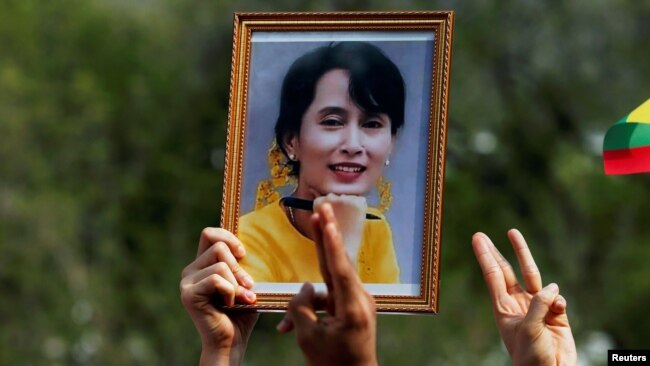
FILE PHOTO: A person holds a picture of leader Aung San Suu Kyi as Myanmar citizens protest against the military coup in front of the UN office in Bangkok, Thailand February 22, 2021.FILE PHOTO: 2021年2月22日、タイ・バンコクの国連事務所前で、ミャンマー市民が軍事クーデターに抗議する中、アウンサンスーチー指導者の写真を手にする人。
アウンサンスーチー氏は15年間、自宅で軟禁されていました。彼女は選挙に参加するために解放され、2015年には当選しました。その後の数年間、スーチー氏は、国連がthe Rohingya Muslim minority少数派のイスラム教徒であるロヒンギャに対する虐殺キャンペーンと呼んだものを実行する際に、軍部側に立ったことで批判を浴びました。
しかし、スーチー政権は、軍の力を弱め、外国からの投資を得るためにいくつかのステップを踏んでいました。ミャンマーの通貨チャットは、アジアで最も高いパフォーマンスを示しました。世界銀行は、COVID-19の健康問題があっても、ミャンマーの経済成長を予測していました。
それが、2月1日未明に終わりを告げたのです。スーチー氏とその指導者たちが逮捕され、政権は軍政への直接復帰を宣言したのです。
The rights group Assistance Association for Political Prisoners政治犯のための権利団体支援協会(AAPP)によると、その後、政権軍による攻撃で1,200人以上が死亡したと言います。
また、政権や地元メディアの報道によると、レジスタンスによって数百人が殺害されたといいます。新たに結成されたゲリラ・グループが、情報提供者と思われる人物や部隊を殺害したといいます。
戦闘は国中に広がる
長年の活動家である Bo Kyi ボ・カイ氏は、AAPPの共同設立者です。彼は、今こそ政権を打倒できると信じています。若い反乱軍は、独創的なアイデアと優れた政治的理解を持っているといいます。彼らは、この国の多くの民族を団結させようとしています。スマートフォンやインターネットの普及により、軍部は自らの行動を隠すことが難しくなりました。ソーシャルメディアでは、暴力行為の報告が数分で大きく広がります。
図書館員
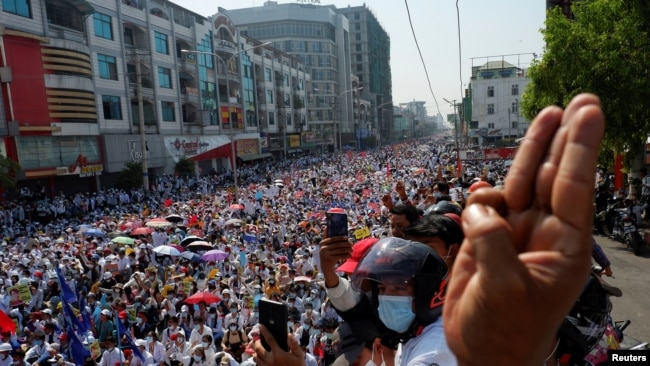
People protest against the military coup in Mandalay, Myanmar February 22, 2021. Picture taken February 22, 2021.ミャンマーのマンダレーで軍事クーデターに抗議する人々 2021年2月22日。写真は2021年2月22日撮影。
クーデターの3日後、Tayzar Sanタイザー・サンさんと友人たちは、マンダレーの医科大学の前に集まりました。彼らは、"民主主義を守れ"、"軍政に対する人々の抗議"、"人々の投票を尊重せよ "と書かれた看板を持っていました。彼らはすぐに立ち去りましたが、その数分後、警察は4人の若者を逮捕したのである。
彼らの行動がきっかけとなって、各地で抗議活動が行われるようになりました。
タイザー・サンさんは、家族の安全を守るために家族を残して出発しました。彼は毎日抗議活動を始めました。Facebookでは、人々に街頭に立つことを呼びかけました。"リーダーを探すな、待つな...地域のすべての人々よ、出てきてくれ"
家では、2歳になった娘がテレビでしか彼を見ていません。
密林
4月、マンダレーから長いバスの旅を終えたグエグエさんたちは、連絡先の人に案内されて、ジャングルに近い村にある古い学校に行きました。彼らの一人によると、グエグエさんはそこで訓練を受けた最初の女性だといいます。
「『何も準備していないので、女性は受け入れない』と彼らに言われました」とグエグエさんは話しました。『とてもきつよ』と言われたので、私は彼らに言ったのです:『疲れるかどうかはどうでもいい。参加しなければならない』のだと。」
そこから合宿所に移動し、さらに数人の女性がやってきました。一緒に合宿所を作り上げていいきました。
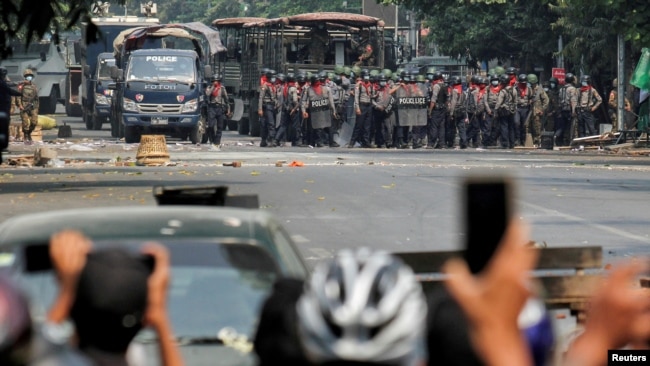
FILE PHOTO: 2021年3月3日、ミャンマーのマンダレーで行われた反クーデターの抗議活動で、道路に立つ警察。
電話でグエグエさんは、これまでの人生で本当に困難なことをしたことがなかったことを理解したと言っています。彼女は、自分がこのような状況で生活することになるとは”夢にも思わなかった”と語りました。
何週間も沈黙を守っていたグエグエさんは、9月初旬にロイターの記者に短いメッセージを送りました。彼女のグループは、軍が近づいてきたためにキャンプを移動しなければなりませんでした。
「現地で犠牲になっている若者たちのことを忘れてほしくありません」と電話で語ります。「私たちはまだここにいます。」
Young Burmese Risking All to Fight Military Leaders
Gue Gue used to be a travel guide in Mandalay, Myanmar, an ancient royal city that has moved quickly into the 21st century. Today, it has shiny new shopping centers, well-dressed students and popular eateries.
Gue had never thought of herself as politically active. But that changed earlier this year. Myanmar’s military seized power in a coup on February 1, overthrowing the civilian government. In the months that followed, hundreds of protesters were killed by troops on the streets.
Now, Gue is in a hidden rebel training camp.
The members of the resistance say they will fight the “final battle” against military rule.
Today’s generation of young people have grown up in a world of smartphones and greater political freedom, unlike their parents. They say they are ready to pay any price in order to overthrow a government that threatens to take them back to a dark past.
On an April evening, Gue Gue secretly left her family home. A few weeks later, she was in a rebel training camp in the jungle. There, she had a medical emergency – her appendix was infected and had to be removed. The operation was carried out in a poorly equipped medical center without any medicine to take away the pain. She had to stay awake during the operation.
Since the coup, Gue Gue had seen many of her generation killed by troops on the streets of her hometown as they called for democracy. There was hope that the international community would take action against the military’s increasing violence. When no action was taken, thousands like Gue Gue decided the only choice was force.
Two faces of the resistance
The army has been the most powerful institution in the country since it became an independent nation in 1948. The military has stood against popular uprisings and civil war for many years. That includes the 1988 uprising that led to the appearance of Aung San Suu Kyi as a human rights leader.
The men and women rebelling against Myanmar’s military say they will be the last generation to live under the control of the country’s military. In the months since the February coup, university teachers, day laborers, technology workers, students, artists and others have become guerrilla fighters.
The International Crisis Group reported in October that hundreds of armed groups have begun operating across the country. Many groups call themselves People’s Defense Forces, or PDFs. Famous people and actors, wanted by the officials for supporting the protests, have appeared on social media holding guns.
Tayzar San is a 32-year-old librarian. He and others like him have been hiding in cities, organizing secret demonstrations, sending money to striking workers and planning. He lives out of a backpack, moving from place to place. The government has offered a $5,600 reward for his capture. He has not seen his wife and daughter in many months.
The junta has promised to hold elections within two years. Speaking in October, army chief and coup leader Min Aung Hlaing said the junta was working on a plan to reach a “true union based on democracy and federalism.” He said the leadership was working to “change the country peacefully.”
The country of 55 million people once seemed to be on its way to becoming Asia’s newest semi-democratic nation. In the 70 years since it won independence from colonial Britain, it has had less than 25 years of civilian governance.
House arrest for Suu Kyi
Words in This Story
jungle – n. a tropical forest where plants and trees grow very thickly
institution – n. an established organization
uprising – n. a usually violent effort by many people to change the government or leader of a country
reward – n. money or another kind of payment that is given or received for something that has been done or that is offered for something that might be done
librarian – n. a person who works in a library (a place where many books are kept and may be borrowed)
backpack – n. a bag for carrying things that has two shoulder straps and is carried on the back
junta – n. a military group controlling a government after taking control of it by force
according to – prep. as stated, reported, or recorded by (someone or something)
infrastructure – n. the basic equipment and structures (such as roads and bridges) that are needed for a country, region, or organization to function properly
